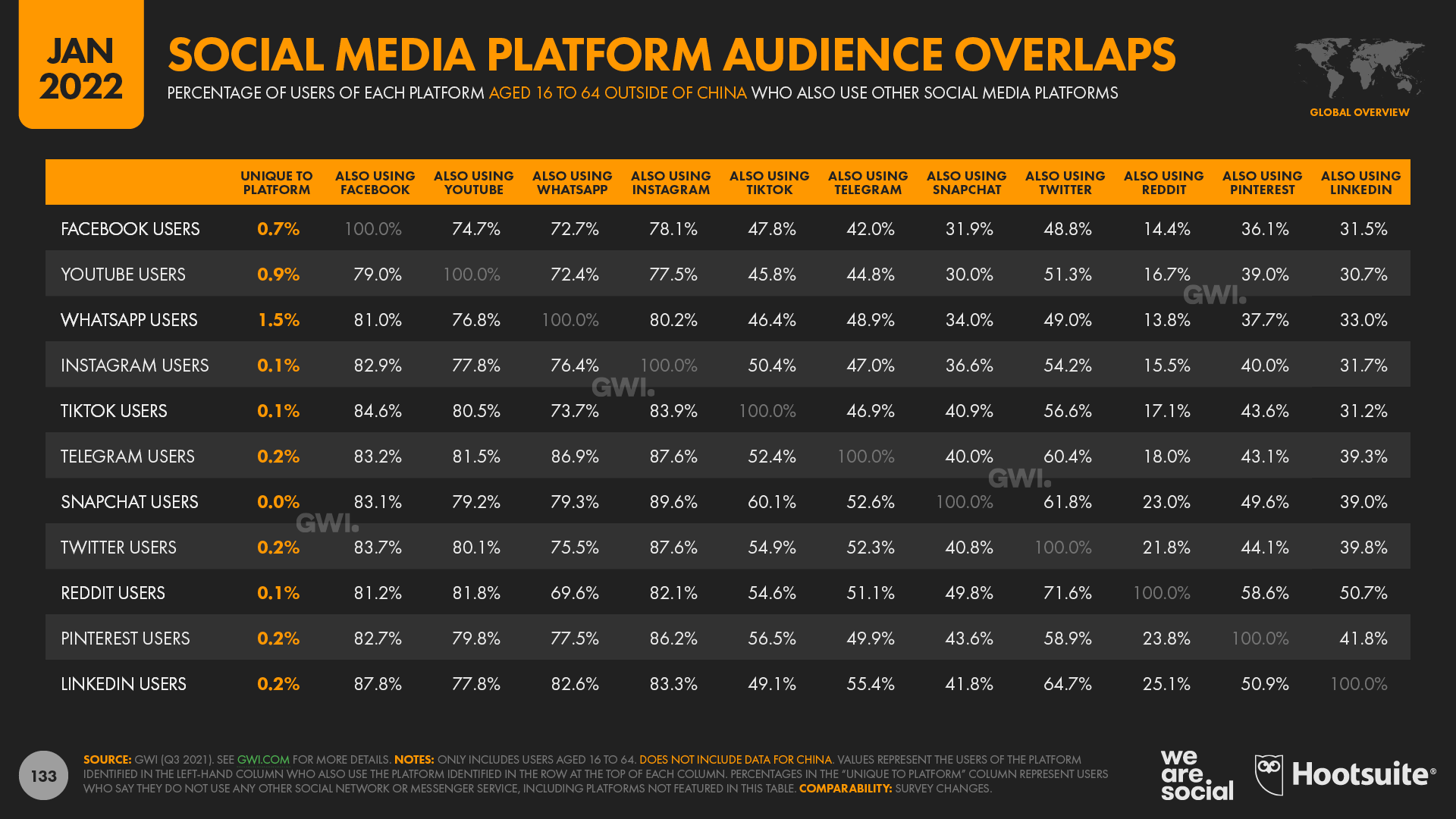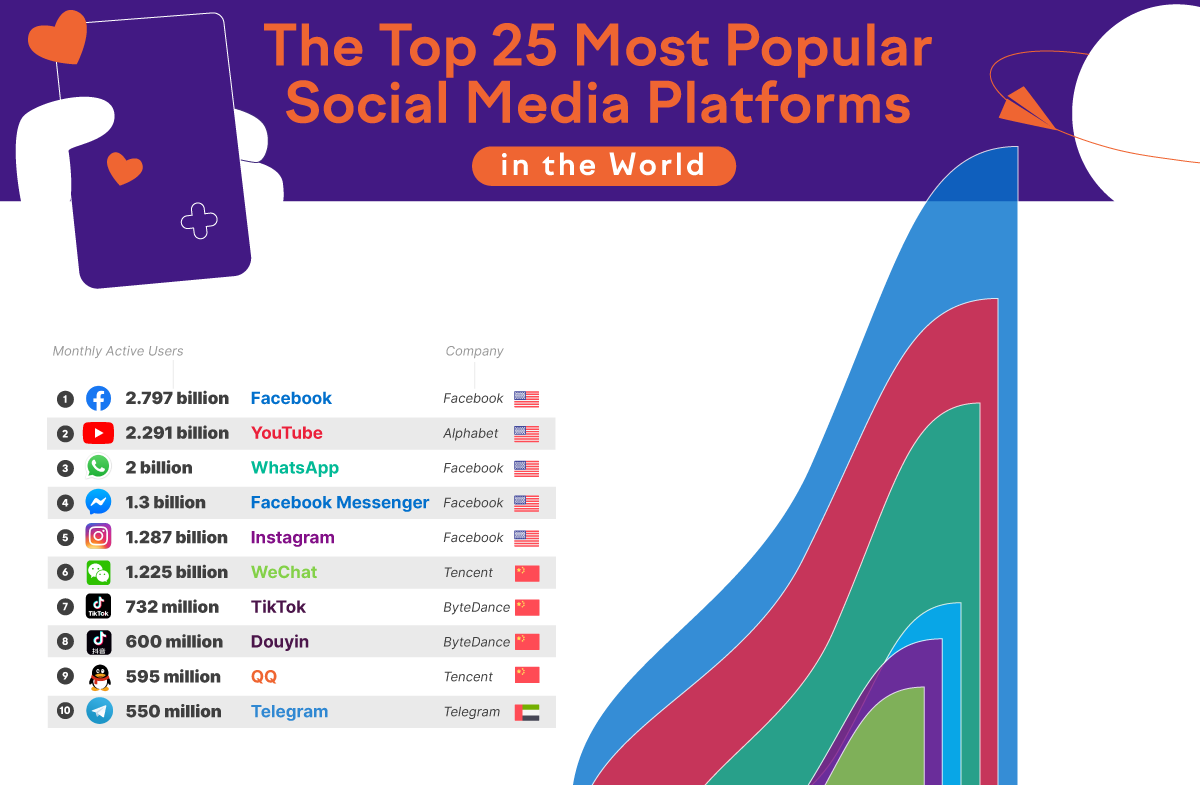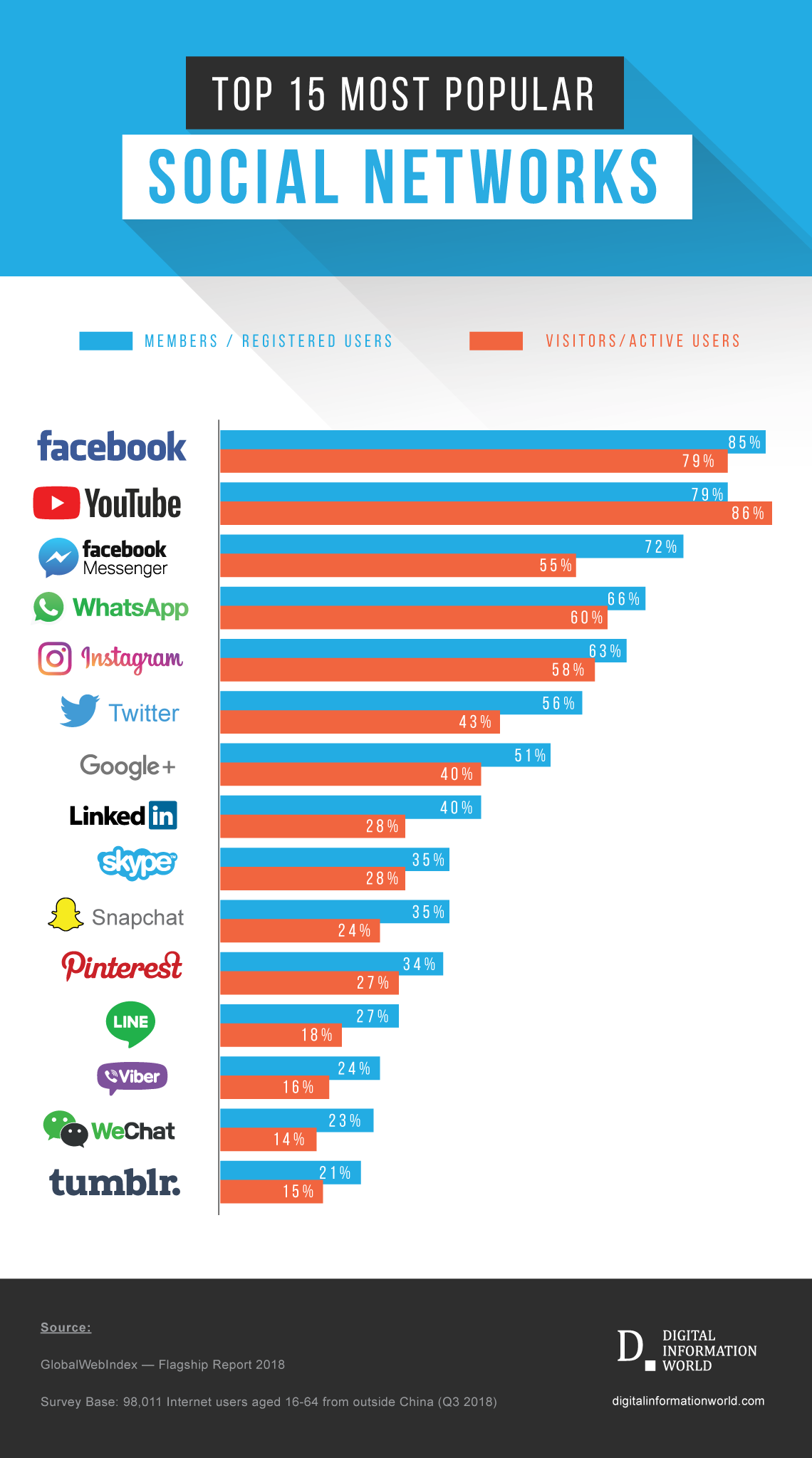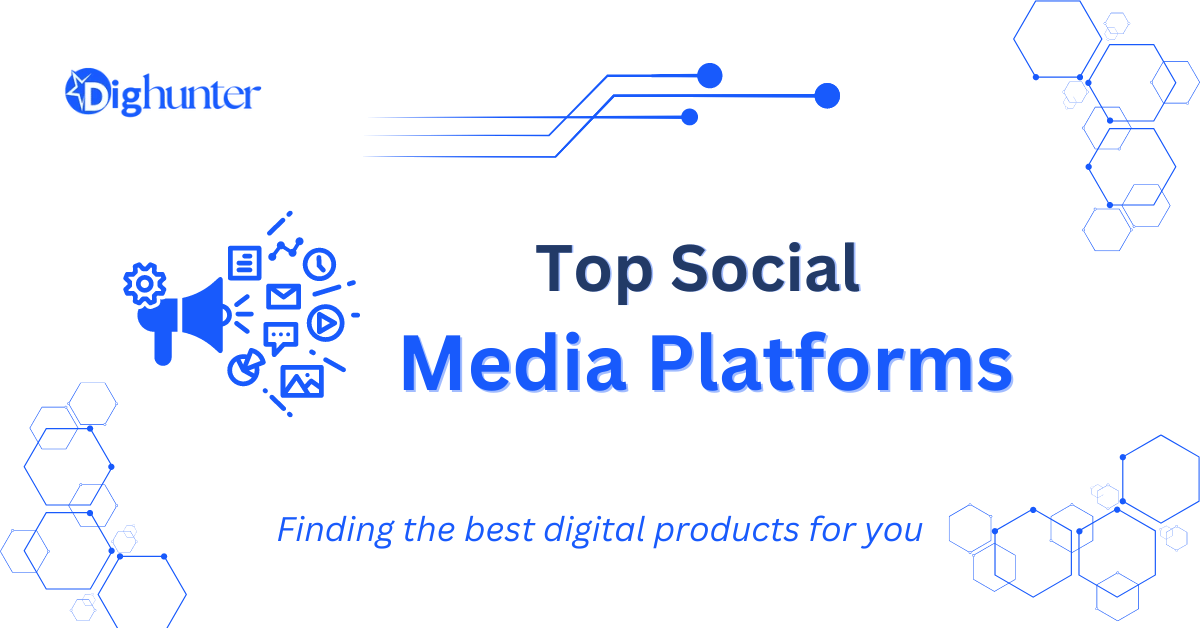Facebook, Instagram, Twitter, LinkedIn, and TikTok are the top social media platforms globally. These platforms boast millions of active users.
Social media platforms play a crucial role in modern communication and marketing. Facebook leads with its vast user base and versatile features. Instagram follows closely, popular for its visual-centric content. Twitter is known for real-time updates and trending topics. LinkedIn focuses on professional networking and career growth.
TikTok has gained immense popularity for its short-form videos and creative content. Each platform offers unique features and caters to different user needs. Businesses and individuals use these platforms to connect, engage, and grow their online presence. Understanding the strengths of each can help optimize social media strategies.

Credit: datareportal.com
➡️ Leading Platforms
In digital marketing, social media platforms have transformed how we communicate, share, and interact with the world. Among countless options, some platforms stand out due to their massive user base and unique features. These leading platforms dominate the social media landscape, offering various ways to connect and engage. Below, we explore the top social media platforms in the world, focusing on their unique qualities and impact.
Facebook, launched in 2004, remains a giant in social media marketing. With over 2.8 billion active users, it connects people globally. Facebook offers numerous features, making it a versatile platform for both personal and business use.
Key features of Facebook include:
- News Feed: Stay updated with friends’ posts and trending news.
- Facebook Groups: Join or create groups for shared interests.
- Marketplace: Buy and sell items locally.
- Messenger: Chat privately or in groups, with text, voice, or video.
For businesses, Facebook offers powerful tools:
- Facebook Ads: Target specific audiences with detailed ad campaigns.
- Facebook Pages: Create a business page to engage customers and share updates.
- Insights: Analyze user engagement and reach to optimize content.
Here’s a quick overview of Facebook’s statistics:
| Feature | Details |
|---|---|
| Active Users | 2.8 billion |
| Launched | 2004 |
| Founders | Mark Zuckerberg, Eduardo Saverin, Andrew McCollum, Dustin Moskovitz, Chris Hughes |
Instagram, launched in 2010, is a popular platform for sharing photos and videos. With over 1 billion active users, it appeals to a younger audience and is known for its visual content.
Key features of Instagram include:
- Stories: Share temporary photos and videos that disappear after 24 hours.
- IGTV: Post long-form videos to engage followers.
- Reels: Create short, engaging videos with music and effects.
- Direct Messages: Communicate privately with other users.
Instagram also offers business features:
- Instagram Ads: Promote products and services through targeted ads.
- Business Profiles: Access insights and tools tailored for businesses.
- Shopping: Tag products in posts and stories to drive sales.
Here’s a quick overview of Instagram’s statistics:
| Feature | Details |
|---|---|
| Active Users | 1 billion |
| Launched | 2010 |
| Founders | Kevin Systrom, Mike Krieger |
➡️ Emerging Networks
Social media platforms have transformed the way we connect, share, and communicate. While giants like Facebook and Instagram dominate the scene, several emerging networks have captured the attention of users worldwide. These platforms cater to diverse interests and offer unique features. Let’s explore two of these rising stars: TikTok and Snapchat.
Tiktok
TikTok is a video-sharing app that allows users to create and share short videos. It’s particularly popular among younger audiences. The platform’s algorithm quickly learns what users like and shows them similar content.
Here are some key features of TikTok:
- Short-form videos: Users can create videos up to 3 minutes long.
- Viral trends: Popular challenges and trends spread quickly.
- Music integration: Users can add music to their videos from a vast library.
- Editing tools: A variety of filters, effects, and editing tools are available.
TikTok has grown rapidly since its launch. It has become a hub for creative expression and viral content. The platform’s popularity is evident in the numbers:
| Statistic | Value |
|---|---|
| Monthly Active Users | 1 billion |
| Downloads | 2 billion+ |
| Average User Age | 16-24 years |
Snapchat
Snapchat is a multimedia messaging app known for its disappearing messages. It offers a unique way for users to communicate through snaps, which are photos or videos that vanish after being viewed.
Key features of Snapchat include:
- Snaps: Photos or videos that disappear after viewing.
- Stories: A collection of snaps viewable for 24 hours.
- Filters and Lenses: Augmented reality effects that enhance snaps.
- Snap Map: A map feature showing friends’ locations.
Snapchat remains a favorite among younger users. Its unique features and focus on privacy set it apart. Here’s a snapshot of Snapchat’s reach:
| Statistic | Value |
|---|---|
| Monthly Active Users | 500 million |
| Daily Snaps Created | 5 billion |
| Average User Age | 13-24 years |
➡️ Professional Spaces
In today’s digital age, social media platforms are essential for both personal and professional growth. While platforms like Facebook and Instagram focus on personal connections, others cater specifically to professional networking and career development. These professional spaces are invaluable for job seekers, business professionals, and companies. They offer opportunities for networking, job searching, and industry insights. Let’s explore some of the top professional social media platforms in the world.
LinkedIn is the largest professional network in the world. It connects professionals from various industries and offers a plethora of features for career development. With over 700 million users, LinkedIn is a powerhouse for networking and job searching.
On LinkedIn, users can:
- Create detailed profiles showcasing their work experience and skills.
- Connect with colleagues, industry leaders, and potential employers.
- Join industry-specific groups to engage in discussions and share knowledge.
- Follow companies to stay updated on job openings and company news.
- Publish articles and posts to build personal brands and share expertise.
LinkedIn also offers a premium subscription service, which provides:
- Advanced search filters to find the right job or candidate.
- InMail credits for direct messaging potential employers or clients.
- Insights into who viewed your profile and how to improve visibility.
Moreover, LinkedIn Learning offers a wide range of courses to help users acquire new skills and stay competitive in their fields. Whether you’re an entry-level professional or a seasoned executive, LinkedIn is an essential tool for career growth.
Glassdoor
Glassdoor is another prominent platform in the professional space. It focuses on transparency in the workplace by providing company reviews, salary information, and interview insights. Glassdoor helps job seekers make informed decisions about potential employers.
Key features of Glassdoor include:
- Company reviews from current and former employees.
- Salary reports based on job titles, companies, and locations.
- Interview reviews and questions to help candidates prepare.
- Job postings from various industries and locations.
- Company ratings on factors like culture, work-life balance, and benefits.
Glassdoor’s unique insights allow users to:
- Compare salaries to ensure fair compensation.
- Research company cultures before applying.
- Prepare for interviews with real-life questions and experiences.
For employers, Glassdoor provides tools to manage company profiles and respond to reviews. This transparency fosters trust and helps attract top talent. Overall, Glassdoor is a valuable resource for both job seekers and employers aiming to create better workplaces.
➡️ Visual Platforms
Social media has revolutionized how we share and consume content. Among the myriad of platforms, visual platforms have carved a niche. These platforms focus on images and videos, offering a rich, engaging user experience. They are ideal for sharing creative content and building a visual brand identity.
Pinterest is a visual discovery engine. It lets users find ideas for their interests and hobbies. The platform is home to billions of pins, each serving as a source of inspiration. Users create and share boards, organizing their favorite pins. Businesses use Pinterest to drive traffic and sales.
Key features of Pinterest include:
- Pinning: Save and share images and links.
- Boards: Organize pins by themes or topics.
- Rich Pins: Provide extra information, like product details or recipes.
- Promoted Pins: Paid pins that reach a larger audience.
Pinterest is popular among DIY enthusiasts, fashion lovers, and foodies. It also attracts a significant number of home decor and travel fans.
| Feature | Benefit |
|---|---|
| Visual Search | Find similar images easily. |
| Shopping Integration | Shop directly from pins. |
| Analytics | Measure pin performance. |
Youtube
YouTube is the largest video-sharing platform globally. Users upload, share, and watch videos on various topics. It is a hub for entertainment, education, and information. Many content creators have turned YouTube into their full-time career.
Key features of YouTube include:
- Channels: Personal spaces for users to upload and organize their videos.
- Subscriptions: Follow favorite channels for updates.
- Monetization: Earn money through ads and sponsorships.
- Live Streaming: Broadcast live events and interact with viewers in real-time.
YouTube caters to a broad audience, from gamers and vloggers to educators and marketers. It is also a powerful tool for SEO, as videos often rank high on search engines.
| Feature | Benefit |
|---|---|
| High Reach | Access to a global audience. |
| Engagement | Interactive content with likes, comments, and shares. |
| Analytics | Insights on viewer behavior and video performance. |
➡️ Microblogging Sites
Social media platforms have transformed how we connect and share information. Among these, microblogging sites stand out. These platforms allow users to post short, frequent updates. They are perfect for quick thoughts, links, and multimedia. Two of the most popular microblogging sites are Twitter and Tumblr. Let’s explore these platforms in detail.
Twitter is a powerful microblogging platform. Users can post short messages called “tweets.” Each tweet can be up to 280 characters long. This makes Twitter ideal for quick updates and real-time communication.
Here are some key features of Twitter:
- Hashtags: Use hashtags to categorize tweets and join conversations.
- Retweets: Share tweets from others with your followers.
- Mentions: Tag other users in your tweets using the “@” symbol.
- Trends: See what topics are trending globally or locally.
Twitter is widely used by celebrities, politicians, and businesses. It’s a great tool for branding and customer engagement. Many users rely on Twitter for news and live updates.
Here’s a brief comparison of Twitter’s user demographics:
| Age Group | Percentage |
|---|---|
| 18-29 | 38% |
| 30-49 | 26% |
| 50-64 | 17% |
| 65+ | 7% |
Twitter is a versatile platform. It’s easy to use and has a massive user base. Whether you want to follow trends or engage with a community, Twitter is an excellent choice.
Tumblr
Tumblr is another popular microblogging site. It allows users to post multimedia content. You can share text, photos, quotes, links, and videos. Tumblr combines the features of a blog and a social network.
Key features of Tumblr include:
- Customizable Themes: Personalize your blog with various themes.
- Reblogs: Share posts from other users on your blog.
- Tags: Use tags to categorize your posts and make them discoverable.
- Asks: Allow users to ask questions on your blog.
Tumblr is popular among younger audiences. It’s a creative space for sharing art, memes, and personal stories. Users enjoy the freedom to express themselves in various formats.
Here’s a snapshot of Tumblr’s user demographics:
| Age Group | Percentage |
|---|---|
| 18-24 | 41% |
| 25-34 | 34% |
| 35-44 | 15% |
| 45+ | 10% |
Tumblr is a haven for creatives. It’s easy to start a blog and build a following. Whether you want to share your art or connect with like-minded individuals, Tumblr is a great platform to explore.

Credit: routenote.com
➡️ Messaging Apps
Social media platforms have transformed how we connect with others. Among these, messaging apps stand out. These apps make real-time communication easy and fast. They allow users to share texts, images, videos, and more. Let’s explore two of the top messaging apps: WhatsApp and Telegram.
WhatsApp is one of the most popular messaging apps globally. Over 2 billion users trust WhatsApp for their daily communication needs. It offers a range of features that make messaging simple and enjoyable.
Here are some key features of WhatsApp:
- Text Messaging: Send and receive text messages for free.
- Voice and Video Calls: Make high-quality voice and video calls to anyone around the world.
- Media Sharing: Share photos, videos, documents, and voice messages.
- Group Chats: Create group chats with up to 256 members.
- End-to-End Encryption: Ensure your messages and calls are secure.
WhatsApp also supports status updates that disappear after 24 hours. This feature allows users to share moments from their day with friends and family.
Another significant advantage of WhatsApp is its availability on multiple platforms. Users can access WhatsApp on their phones, tablets, and desktops.
WhatsApp is available in over 180 countries. Its user-friendly interface and reliability make it a top choice for many.
Telegram
Telegram is another leading messaging app with a growing user base. It boasts over 500 million active users. Known for its speed and security, Telegram offers several unique features.
Here are some standout features of Telegram:
- Cloud-Based Messaging: Access your messages from multiple devices simultaneously.
- Secret Chats: Use end-to-end encryption for highly secure conversations.
- Media and File Sharing: Share files up to 2GB in size.
- Group Chats: Create groups with up to 200,000 members.
- Channels: Broadcast messages to an unlimited audience.
Telegram also supports bots that can perform various tasks. These include sending reminders, playing games, and even processing payments.
One of Telegram’s unique features is its focus on privacy and security. Users can set messages to self-destruct after a certain period. Additionally, Telegram does not store messages on its servers, ensuring complete privacy.
Telegram is available on multiple platforms, including iOS, Android, and desktop. Its versatility and security make it a favorite for many users worldwide.
➡️ Regional Favorites
Social media platforms connect people across the globe. While giants like Facebook and Instagram dominate worldwide, some platforms have become regional favorites. These local champions cater to specific cultural and linguistic needs, making them immensely popular in their regions.
WeChat is the go-to platform in China. It’s not just a messaging app; it’s a super app. Users can chat, make video calls, share moments, and even pay for goods and services.
- Messaging and Video Calls: WeChat supports text, voice, and video messaging, making communication seamless.
- Moments: Users share photos, videos, and articles with friends.
- WeChat Pay: This feature allows users to pay bills, transfer money, and make online purchases.
- Mini Programs: These are sub-applications within WeChat, providing services like e-commerce and gaming.
WeChat’s integration with daily life is profound. People use it to book taxis, order food, and even schedule doctor appointments. Its versatility makes it indispensable in China.
| Feature | Description |
|---|---|
| Messaging | Text, voice, and video communication |
| Moments | Share photos, videos, and links |
| WeChat Pay | Mobile payment system |
| Mini Programs | Sub-applications for various services |
Vk
VK, also known as VKontakte, is Russia’s largest social media platform. It’s similar to Facebook but tailored for the Russian-speaking audience. VK offers a wide range of features that make it a favorite.
- Messaging: Users can send text, voice messages, and make video calls.
- News Feed: Keep up with friends’ updates, posts, and shared content.
- Groups and Pages: Join communities based on interests, hobbies, or local events.
- Music and Videos: VK has a vast library of music and videos that users can stream or download.
VK stands out because of its rich media content. Users can listen to music, watch movies, and even share their playlists. It integrates with other Russian services, enhancing its usability.
| Feature | Description |
|---|---|
| Messaging | Text, voice, and video communication |
| News Feed | Updates from friends and communities |
| Groups and Pages | Communities for various interests |
| Music and Videos | Streaming and downloading content |

Credit: www.digitalinformationworld.com
➡️ Future Trends
Social media platforms have become integral to our daily lives. New features and trends keep emerging. Understanding future trends in social media can help us stay ahead. Let’s explore some of the top trends shaping the future of social media.
Augmented Reality
Augmented Reality (AR) is changing how we interact online. AR lets us overlay digital content onto the real world. This technology makes social media more engaging and immersive.
Platforms like Snapchat and Instagram already use AR filters. These filters let users add fun elements to their photos and videos. Here are some ways AR is transforming social media:
- Enhanced Shopping Experiences: Users can try on clothes or see how furniture looks in their homes.
- Interactive Content: Brands can create interactive ads and experiences.
- Real-time Effects: Live streaming with AR effects can make broadcasts more engaging.
Here’s a table summarizing the impact of AR on social media:
| Feature | Impact |
|---|---|
| AR Filters | More user engagement |
| AR Shopping | Increased sales |
| AR Ads | Higher interaction rates |
Decentralization
Decentralization is another trend shaping social media. Traditional platforms are controlled by a central authority. Decentralized platforms, however, are built on blockchain technology. They give users more control over their data.
Here are some benefits of decentralized social media:
- Data Ownership: Users own their data and decide who can access it.
- Transparency: All transactions are recorded on a public ledger.
- Reduced Censorship: Content is harder to censor as there’s no central authority.
Some popular decentralized social media platforms include:
- Steemit: A blockchain-based blogging and social media platform.
- Minds: An open-source social network that rewards users with tokens.
- Peepeth: A decentralized alternative to Twitter.
Decentralization is likely to make social media more democratic and secure. It provides a new way for users to interact online while maintaining privacy and freedom.
➡️ Frequently Asked Questions
- What Are The Top Social Media Platforms In 2023?
The top social media platforms in 2023 include Facebook, Instagram, TikTok, Twitter, and LinkedIn. These platforms boast the highest user engagement rates. They are popular for various types of content and audiences.
- Which Social Media Platform Has The Most Users?
Facebook has the most users globally. It has over 2. 8 billion monthly active users. Its extensive reach makes it the largest social media platform.
- How Does Tiktok Differ From Instagram?
TikTok focuses on short video content, while Instagram offers a mix of photos and videos. TikTok is known for its viral trends. Instagram features stories and IGTV for longer videos.
- Why Is Linkedin Important For Professionals?
LinkedIn is crucial for networking and career growth. It connects professionals and employers. It also offers industry news and insights. LinkedIn helps in building a professional online presence.
➡️ Final Thought
Exploring the top social media platforms helps you connect with a global audience. Each platform offers unique features and benefits. Choose the one that aligns with your goals. Stay updated with trends to maximize your social media presence. Engage, interact, and grow your online community effectively.
Happy social networking!




